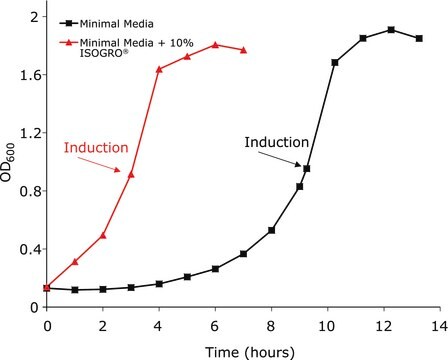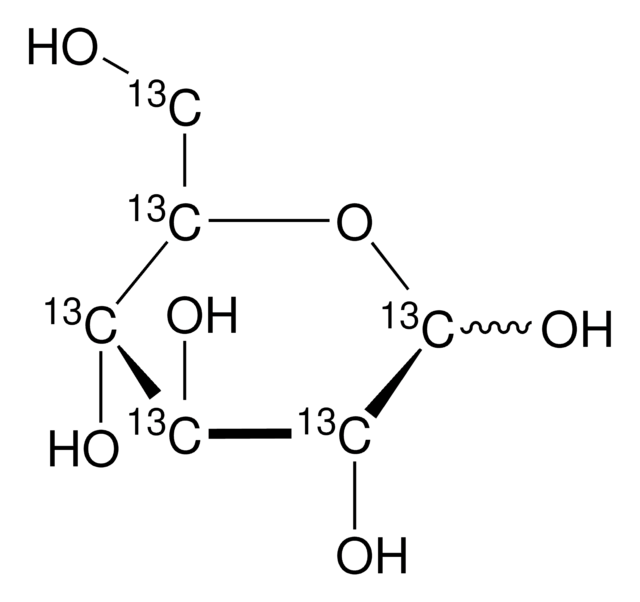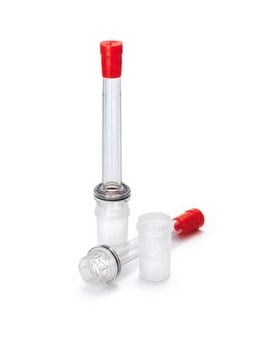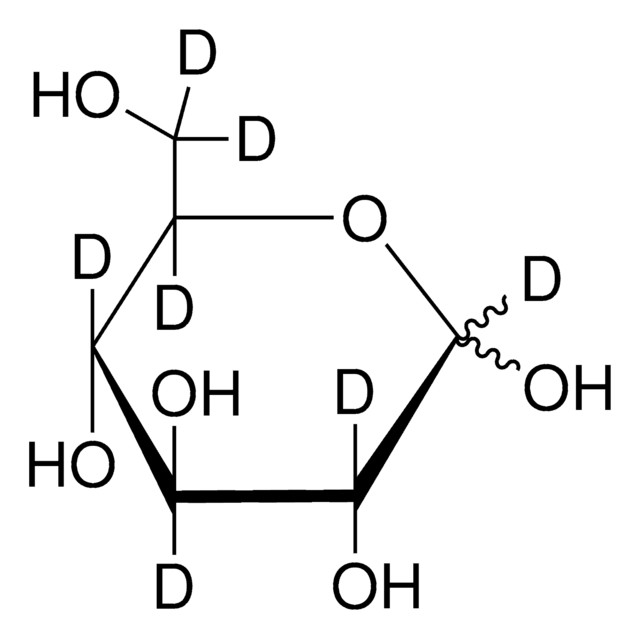Wszystkie zdjęcia(1)
Key Documents
606863
ISOGRO®-13C Powder -Growth Medium
99 atom % 13C
Zaloguj sięWyświetlanie cen organizacyjnych i kontraktowych
About This Item
Polecane produkty
czystość izotopowa
99 atom % 13C
Postać
solid
metody
bio NMR: suitable
protein expression: suitable
temp. przechowywania
−20°C
Opis ogólny
ISOGRO® media is required for overcoming the growth limitations of minimal media. ISOGRO products are lysates of algae grown with stable isotopes (13C, 15N, and/or D). ISOGRO®-13C powder -growth medium gives uniform labeling for protein expression NMR (nuclear magnetic resonance) studies.
A typical algal lysate (ISOGRO medium) contains: 30% salts, 3% water, 2% glucose and 65% amino acids/peptides.
A typical algal lysate (ISOGRO medium) contains: 30% salts, 3% water, 2% glucose and 65% amino acids/peptides.
Opakowanie
This product may be available from bulk stock and can be packaged on demand. For information on pricing, availability and packaging, please contact Stable Isotopes Customer Service.
Informacje prawne
ISOGRO is a registered trademark of Merck KGaA, Darmstadt, Germany
This page may contain text that has been machine translated.
Kod klasy składowania
11 - Combustible Solids
Klasa zagrożenia wodnego (WGK)
WGK 1
Temperatura zapłonu (°F)
Not applicable
Temperatura zapłonu (°C)
Not applicable
Wybierz jedną z najnowszych wersji:
Certyfikaty analizy (CoA)
Lot/Batch Number
Nie widzisz odpowiedniej wersji?
Jeśli potrzebujesz konkretnej wersji, możesz wyszukać konkretny certyfikat według numeru partii lub serii.
Masz już ten produkt?
Dokumenty związane z niedawno zakupionymi produktami zostały zamieszczone w Bibliotece dokumentów.
Klienci oglądali również te produkty
Carissa L Perez et al.
Cell metabolism, 8(3), 266-274 (2008-09-03)
Although studies in C. elegans have identified numerous genes involved in fat storage, the next step is to determine how these factors actually affect in vivo lipid metabolism. We have developed a (13)C isotope assay to quantify the contribution of
Xavier Hanoulle et al.
The Journal of biological chemistry, 282(47), 34148-34158 (2007-09-15)
The chemotaxis and integrin-mediated adhesion of T lymphocytes triggered by secreted cyclophilin B (CypB) depend on interactions with both cell surface heparan sulfate proteoglycans (HSPG) and the extracellular domain of the CD147 membrane receptor. Here, we use NMR spectroscopy to
Weizhi Liu et al.
The Journal of biological chemistry, 284(45), 31336-31349 (2009-08-28)
The eukaryotic translation initiation factor eIF4E recognizes the mRNA cap, a key step in translation initiation. Here we have characterized eIF4E from the human parasite Schistosoma mansoni. Schistosome mRNAs have either the typical monomethylguanosine (m(7)G) or a trimethylguanosine (m(2,2,7)G) cap
Melanie H Smith et al.
The Journal of biological chemistry, 289(37), 25670-25677 (2014-08-03)
A substantial fraction of nascent proteins delivered into the endoplasmic reticulum (ER) never reach their native conformations. Eukaryotes use a series of complementary pathways to efficiently recognize and dispose of these terminally misfolded proteins. In this process, collectively termed ER-associated
Brendan C Mullaney et al.
Cell metabolism, 12(4), 398-410 (2010-10-05)
Acyl-CoA synthases are important for lipid synthesis and breakdown, generation of signaling molecules, and lipid modification of proteins, highlighting the challenge of understanding metabolic pathways within intact organisms. From a C. elegans mutagenesis screen, we found that loss of ACS-3, a long-chain
Nasz zespół naukowców ma doświadczenie we wszystkich obszarach badań, w tym w naukach przyrodniczych, materiałoznawstwie, syntezie chemicznej, chromatografii, analityce i wielu innych dziedzinach.
Skontaktuj się z zespołem ds. pomocy technicznej






